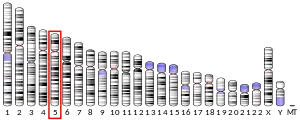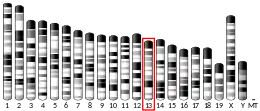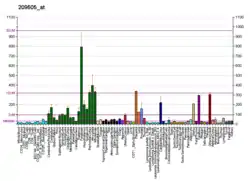COUP-TFI
COUP-TF1 (COUP Transcription Factor 1) also known as NR2F1 (Nuclear Receptor subfamily 2, group F, member 1) is a protein that in humans is encoded by the NR2F1 gene.[5][6] This protein is a member of nuclear hormone receptor family of steroid hormone receptors.
Function
Coup (chicken ovalbumin upstream promoter) transcription factor binds to the ovalbumin promoter and, in conjunction with another protein (S300-II) stimulates initiation of transcription.[7][8] COUP-TF1 binds to both direct repeats and palindromes of the 5'-AGGTCA-3' motif.[9]
Interactions
COUP-TFI has been shown to interact with:
Clinical
Mutations in this gene have been associated with Bosch-Boonstra-Schaaf optic atrophy syndrome.[13]
References
- GRCh38: Ensembl release 89: ENSG00000175745 - Ensembl, May 2017
- GRCm38: Ensembl release 89: ENSMUSG00000069171 - Ensembl, May 2017
- "Human PubMed Reference:". National Center for Biotechnology Information, U.S. National Library of Medicine.
- "Mouse PubMed Reference:". National Center for Biotechnology Information, U.S. National Library of Medicine.
- "Entrez Gene: NR2F1 nuclear receptor subfamily 2, group F, member 1".
- Qiu Y, Krishnan V, Zeng Z, Gilbert DJ, Copeland NG, Gibson L, Yang-Feng T, Jenkins NA, Tsai MJ, Tsai SY (Sep 1995). "Isolation, characterization, and chromosomal localization of mouse and human COUP-TF I and II genes". Genomics. 29 (1): 240–6. doi:10.1006/geno.1995.1237. PMID 8530078.
- Sagami I, Tsai SY, Wang H, Tsai MJ, O'Malley BW (Dec 1986). "Identification of two factors required for transcription of the ovalbumin gene". Molecular and Cellular Biology. 6 (12): 4259–67. doi:10.1128/MCB.6.12.4259. PMC 367207. PMID 3796602.
- Tsai SY, Sagami I, Wang H, Tsai MJ, O'Malley BW (Aug 1987). "Interactions between a DNA-binding transcription factor (COUP) and a non-DNA binding factor (S300-II)". Cell. 50 (5): 701–9. doi:10.1016/0092-8674(87)90328-X. PMID 3040258. S2CID 25136877.
- Tsai SY, Tsai MJ (Apr 1997). "Chick ovalbumin upstream promoter-transcription factors (COUP-TFs): coming of age". Endocrine Reviews. 18 (2): 229–40. doi:10.1210/edrv.18.2.0294. PMID 9101138.
- Avram D, Fields A, Pretty On Top K, Nevrivy DJ, Ishmael JE, Leid M (Apr 2000). "Isolation of a novel family of C(2)H(2) zinc finger proteins implicated in transcriptional repression mediated by chicken ovalbumin upstream promoter transcription factor (COUP-TF) orphan nuclear receptors". The Journal of Biological Chemistry. 275 (14): 10315–22. doi:10.1074/jbc.275.14.10315. PMC 2819356. PMID 10744719.
- Dressel U, Thormeyer D, Altincicek B, Paululat A, Eggert M, Schneider S, Tenbaum SP, Renkawitz R, Baniahmad A (May 1999). "Alien, a highly conserved protein with characteristics of a corepressor for members of the nuclear hormone receptor superfamily". Molecular and Cellular Biology. 19 (5): 3383–94. doi:10.1128/mcb.19.5.3383. PMC 84131. PMID 10207062.
- Métivier R, Gay FA, Hübner MR, Flouriot G, Salbert G, Gannon F, Kah O, Pakdel F (Jul 2002). "Formation of an hER alpha-COUP-TFI complex enhances hER alpha AF-1 through Ser118 phosphorylation by MAPK". The EMBO Journal. 21 (13): 3443–53. doi:10.1093/emboj/cdf344. PMC 126093. PMID 12093745.
- Hobbs MM, Wolters WC, Rayapati AO (2020) Bosch-Boonstra-Schaaf optic atrophy syndrome presenting as new-onset psychosis in a 32-year-old man: A case report and literature review. J Psychiatr Pract 26(1):58-62
External links
- Human NR2F1 genome location and NR2F1 gene details page in the UCSC Genome Browser.
- Human NR2F2 genome location and NR2F2 gene details page in the UCSC Genome Browser.
Further reading
- Kliewer SA, Umesono K, Heyman RA, Mangelsdorf DJ, Dyck JA, Evans RM (Feb 1992). "Retinoid X receptor-COUP-TF interactions modulate retinoic acid signaling". Proceedings of the National Academy of Sciences of the United States of America. 89 (4): 1448–52. Bibcode:1992PNAS...89.1448K. doi:10.1073/pnas.89.4.1448. PMC 48468. PMID 1311101.
- Berrodin TJ, Marks MS, Ozato K, Linney E, Lazar MA (Sep 1992). "Heterodimerization among thyroid hormone receptor, retinoic acid receptor, retinoid X receptor, chicken ovalbumin upstream promoter transcription factor, and an endogenous liver protein". Molecular Endocrinology. 6 (9): 1468–78. doi:10.1210/mend.6.9.1331778. PMID 1331778. S2CID 24291055.
- Ing NH, Beekman JM, Tsai SY, Tsai MJ, O'Malley BW (Sep 1992). "Members of the steroid hormone receptor superfamily interact with TFIIB (S300-II)". The Journal of Biological Chemistry. 267 (25): 17617–23. doi:10.1016/S0021-9258(19)37087-5. PMID 1517211.
- Wang LH, Tsai SY, Cook RG, Beattie WG, Tsai MJ, O'Malley BW (Jul 1989). "COUP transcription factor is a member of the steroid receptor superfamily". Nature. 340 (6229): 163–6. Bibcode:1989Natur.340..163W. doi:10.1038/340163a0. PMID 2739739. S2CID 4364164.
- Miyajima N, Kadowaki Y, Fukushige S, Shimizu S, Semba K, Yamanashi Y, Matsubara K, Toyoshima K, Yamamoto T (Dec 1988). "Identification of two novel members of erbA superfamily by molecular cloning: the gene products of the two are highly related to each other". Nucleic Acids Research. 16 (23): 11057–74. doi:10.1093/nar/16.23.11057. PMC 338996. PMID 2905047.
- Sawaya BE, Rohr O, Aunis D, Schaeffer E (Sep 1996). "Chicken ovalbumin upstream promoter transcription factor, a transcriptional activator of HIV-1 gene expression in human brain cells". The Journal of Biological Chemistry. 271 (38): 23572–6. doi:10.1074/jbc.271.38.23572. PMID 8798567.
- Rohr O, Aunis D, Schaeffer E (Dec 1997). "COUP-TF and Sp1 interact and cooperate in the transcriptional activation of the human immunodeficiency virus type 1 long terminal repeat in human microglial cells". The Journal of Biological Chemistry. 272 (49): 31149–55. doi:10.1074/jbc.272.49.31149. PMID 9388268.
- Dressel U, Thormeyer D, Altincicek B, Paululat A, Eggert M, Schneider S, Tenbaum SP, Renkawitz R, Baniahmad A (May 1999). "Alien, a highly conserved protein with characteristics of a corepressor for members of the nuclear hormone receptor superfamily". Molecular and Cellular Biology. 19 (5): 3383–94. doi:10.1128/mcb.19.5.3383. PMC 84131. PMID 10207062.
- Klinge CM, Kaur K, Swanson HI (Jan 2000). "The aryl hydrocarbon receptor interacts with estrogen receptor alpha and orphan receptors COUP-TFI and ERRalpha1". Archives of Biochemistry and Biophysics. 373 (1): 163–74. doi:10.1006/abbi.1999.1552. PMID 10620335.
- Rohr O, Schwartz C, Hery C, Aunis D, Tardieu M, Schaeffer E (Jan 2000). "The nuclear receptor chicken ovalbumin upstream promoter transcription factor interacts with HIV-1 Tat and stimulates viral replication in human microglial cells". The Journal of Biological Chemistry. 275 (4): 2654–60. doi:10.1074/jbc.275.4.2654. PMID 10644726.
- Sugiyama T, Wang JC, Scott DK, Granner DK (Feb 2000). "Transcription activation by the orphan nuclear receptor, chicken ovalbumin upstream promoter-transcription factor I (COUP-TFI). Definition of the domain involved in the glucocorticoid response of the phosphoenolpyruvate carboxykinase gene". The Journal of Biological Chemistry. 275 (5): 3446–54. doi:10.1074/jbc.275.5.3446. PMID 10652338.
- Vlahou A, Flytzanis CN (Feb 2000). "Subcellular trafficking of the nuclear receptor COUP-TF in the early embryonic cell cycle". Developmental Biology. 218 (2): 284–98. doi:10.1006/dbio.1999.9456. PMID 10656770.
- Avram D, Fields A, Pretty On Top K, Nevrivy DJ, Ishmael JE, Leid M (Apr 2000). "Isolation of a novel family of C(2)H(2) zinc finger proteins implicated in transcriptional repression mediated by chicken ovalbumin upstream promoter transcription factor (COUP-TF) orphan nuclear receptors". The Journal of Biological Chemistry. 275 (14): 10315–22. doi:10.1074/jbc.275.14.10315. PMC 2819356. PMID 10744719.
- Gay F, Anglade I, Gong Z, Salbert G (Oct 2000). "The LIM/homeodomain protein islet-1 modulates estrogen receptor functions". Molecular Endocrinology. 14 (10): 1627–48. doi:10.1210/me.14.10.1627. PMID 11043578.
- You M, Fischer M, Cho WK, Crabb D (Feb 2002). "Transcriptional control of the human aldehyde dehydrogenase 2 promoter by hepatocyte nuclear factor 4: inhibition by cyclic AMP and COUP transcription factors". Archives of Biochemistry and Biophysics. 398 (1): 79–86. doi:10.1006/abbi.2001.2713. PMID 11811951.
- Lin F, Kolluri SK, Chen GQ, Zhang XK (Jun 2002). "Regulation of retinoic acid-induced inhibition of AP-1 activity by orphan receptor chicken ovalbumin upstream promoter-transcription factor". The Journal of Biological Chemistry. 277 (24): 21414–22. doi:10.1074/jbc.M201885200. PMID 11934895.
- Métivier R, Gay FA, Hübner MR, Flouriot G, Salbert G, Gannon F, Kah O, Pakdel F (Jul 2002). "Formation of an hER alpha-COUP-TFI complex enhances hER alpha AF-1 through Ser118 phosphorylation by MAPK". The EMBO Journal. 21 (13): 3443–53. doi:10.1093/emboj/cdf344. PMC 126093. PMID 12093745.
- Yu X, Mertz JE (Feb 2003). "Distinct modes of regulation of transcription of hepatitis B virus by the nuclear receptors HNF4alpha and COUP-TF1". Journal of Virology. 77 (4): 2489–99. doi:10.1128/JVI.77.4.2489-2499.2003. PMC 141100. PMID 12551987.
This article incorporates text from the United States National Library of Medicine, which is in the public domain.





